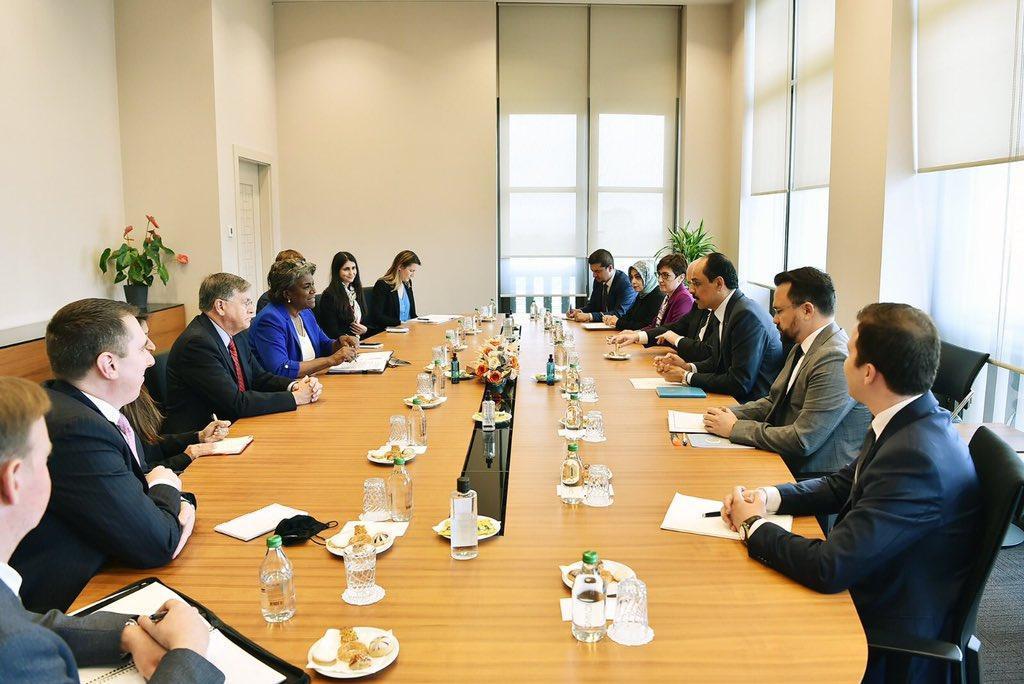
The U.S ambassador to the United Nations visited Turkey on June 2 seeking to ensure that humanitarian aid can be delivered to Syria across borders, a program Russia has severely limited in recent years while insisting the Syrian government should control all assistance to millions in need.
Linda Thomas-Greenfield’s visit comes ahead of the July 10 expiration of the U.N. Security Council mandate for humanitarian aid deliveries, now reduced from four initial international crossing points to a single border crossing from Turkey to Syria’s rebel-held northwest at the insistence of Russia, Syria’s closest ally.
The trip also comes ahead of U.S. President Joe Biden’s first meeting with Turkish President Recep Tayyip Erdoğan on the sidelines of the NATO summit in Brussels on June 14.
The U.S. Mission to the United Nations said in an announcement Tuesday that Thomas-Greenfield would meet with senior Turkish officials during the Wednesday-Friday visit “to discuss opportunities to strengthen the U.S.-Turkey relationship, work with our NATO ally to address global challenges (and) improve cooperation on Syria.”
She held a meeting with Turkish Presidential Spokesperson İbrahim Kalın on June 2.
A senior official at the mission called this “a moment of intense engagement with senior Turkish officials,” pointing to Deputy Secretary of State Wendy Sherman’s visit last week ahead of the Biden-Erdoğan meeting. But the official, who was not authorized to speak publicly, would not say whether Thomas-Greenfield would meet with the Turkish president.
“Turkey is a critical NATO ally, and we have a strategic relationship that spans an enormous breadth of issues and concerns, including global and regional security issues, obviously, economic issues related to democracy and human rights,” the official said, saying the U.S. expects all these issues to be discussed in Thomas-Greenfield’s meetings.
The mission said the talks on Syria would include managing the refugee crisis - Turkey hosts almost 4 million Syrian refugees - and recognizing “Turkey’s crucial role in the facilitation of cross-border assistance.”
Thomas-Greenfield plans to travel to the Turkey-Syrian border to meet with a group of refugees, and she will also meet with humanitarian organizations and United Nations agencies working to assist millions in Syria, the mission said.
The U.N. special envoy for Syria, Geir Pedersen, told the Security Council last week it is “a tragic irony” that ordinary Syrians are facing “immense and growing humanitarian suffering” at this time of relative calm in the more than 10-year conflict. He also lamented the stalled political process, including the failure to start drafting a new Syrian constitution.
Last July, Russia scored a victory for Syria by forcing the Security Council to limit humanitarian aid deliveries to just one crossing point, from Turkey to northwest Idlib at Bab al-Hawa.
The U.S. and many other countries had argued for restoring the Al-Yaroubiya crossing point from Iraq in the northeast that was closed in January 2020. It had been a primary delivery point for health and medical supplies, especially needed during the COVID-19 pandemic. But Russia argued that aid should be delivered from within Syria across conflict lines, and threatened to veto more than one crossing point.
The U.S. Mission said Thomas-Greenfield “will emphasize the urgent need for additional crossings and stepped-up international assistance, as there is no viable alternative to alleviate the vast needs of vulnerable populations in northern Syria - needs that have only been exacerbated by the COVID-19 pandemic.”
Estonia’s U.N. ambassador, Sven Jurgenson, who took over the council presidency Tuesday, indicated at a news conference that Russia is already being difficult.
“The talks are starting already,” he said. “At one of the last meetings, we’ve heard that one of the members is planning to make things difficult again, like they’ve usually done."
Jurgenson said past negotiations show that “at the very end they give in, but they want to cut off something.”
U.N. humanitarian chief Mark Lowcock told the Security Council last week that delivering aid across conflict lines cannot replace cross-border deliveries and called the cross-border operation at Bab al-Hawa “a lifeline.”
If it isn’t reauthorized, he warned, food deliveries for 1.4 million people every month, millions of medical treatments, nutrition for tens of thousands of children and mothers and education supplies for tens of thousands of students will stop.